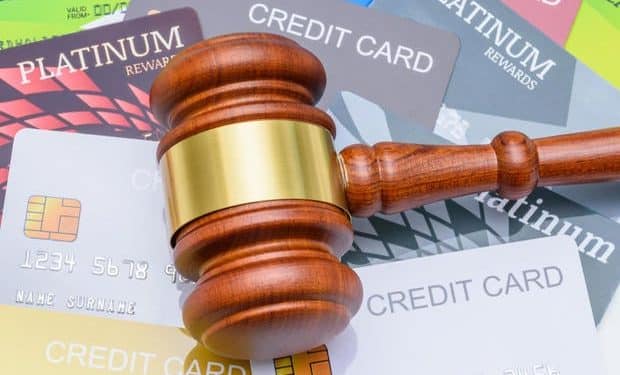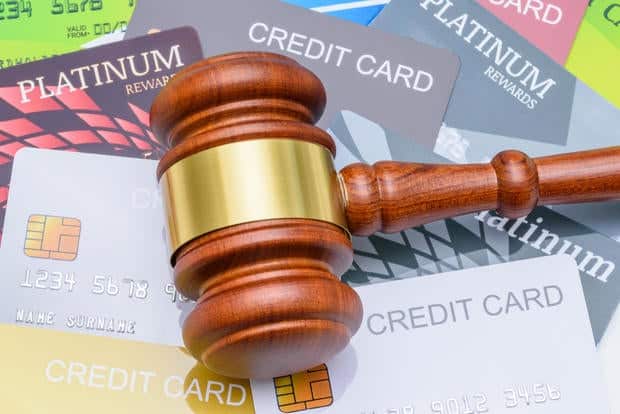Getty Images
Finding out you’re being sued over an old credit card debt can be a stressful experience. After all, these legal proceedings typically mark the culmination of months or even years of missed credit card payments, delinquent accounts, unsuccessful collection attempts and mounting financial pressure. So, receiving a legal summons will often just add to the stress, especially if you’re facing serious financial hardships at that time.
But while being sued over delinquent credit card debt can be a tough issue to face, it’s unfortunately not an uncommon one. As credit card debt and payment delinquencies continue to rise nationwide, more and more cardholders find themselves navigating the complexities that come with being sued by a credit card debt collector. And, if you fail to defend yourself in court or lose your case, the repercussions could make the debt landscape even more difficult to navigate.
That’s because the implications of losing a credit card debt collection lawsuit can extend far beyond the immediate financial burden. But that doesn’t mean all hope is lost. There are various strategies you can use to manage the aftermath of an unfavorable debt collection judgment. Knowing what happens if you lose a credit card debt collection lawsuit — and what these options are — can help you make better choices both during and after the legal proceedings.
See what debt relief options are available to you here.
What happens when you lose a credit card debt collection lawsuit?
When a court rules against you in a credit card debt collection case, several significant consequences can follow. The first is that the creditor or debt collector receives a judgment, which is a court order confirming you owe the debt. This judgment typically includes the original debt amount, accumulated interest and other fees incurred during the collection process.
With a judgment in hand, creditors gain powerful collection tools they didn’t have before. While these tools can vary by state, in general, creditors can pursue wage garnishment, taking up to 25% of your disposable income (or the amount exceeding 30 times the federal minimum wage, whichever is less) in most states.
The creditor may also place liens on your property, freeze your bank accounts or seize non-exempt assets, like real estate or other valuables. While this doesn’t force an immediate sale of your assets, it can complicate future transactions like selling or refinancing loans on your property. The judgment against you also appears on your credit report, where it can remain for up to seven years while impacting your credit score. That, in turn, can significantly hinder your ability to secure loans or favorable interest rates during that time.
Losing a lawsuit often means you’ll be responsible for court fees and attorney’s fees for both parties involved in the lawsuit. Many states also allow creditors to add post-judgment interest to the debt, often at rates higher than the original credit card interest rate. This means the total amount you owe can continue growing even after the judgment is issued.
Take steps to handle your delinquent credit card debt today.
How do you lose a credit card debt collection lawsuit?
There are several ways to lose a credit card debt collection lawsuit. The most common is by default judgment, which occurs when you fail to respond to the lawsuit within the specified timeframe. Without your response, the court automatically rules in the creditor’s favor, assuming all their claims are valid.
You can also lose after actively participating in the case if the creditor successfully proves their claims. This might happen if they present adequate documentation of the debt, including account statements, the original credit agreement and records of payments and charges. If you lack a valid legal defense or can’t effectively challenge the creditor’s evidence, the court will likely rule against you.
Sometimes, procedural mistakes can lead to losing your case. Missing court dates, failing to properly file required documents or not following court rules can result in an unfavorable judgment, regardless of the underlying merits of your defense.
How to get rid of a credit card debt settlement judgment
While a judgment can feel final, several options exist for addressing it. One approach is to simply pay off what’s owed, which may not be possible in all cases — especially after the extra interest, court fees and other costs are added to the total. Some debt collectors will even work with you to come up with a payment plan that allows you to pay off what’s owed over time, but that’s not always the case.
Another option is negotiating a settlement with the creditor — which can be done on your own or with the help of a debt relief expert. Many creditors are willing to accept a lump sum payment for less than the full balance, especially if they believe collecting the full amount will be difficult or time-consuming. While it’s better to start this process before a lawsuit is filed, it’s still possible in many cases to have some of your debt forgiven via debt settlement after a judgment is issued.
In more severe cases, filing for bankruptcy might be an option. Chapter 7 or Chapter 13 bankruptcy can eliminate or restructure judgment debts, though this should be considered a last resort given its long-term impact on your credit and financial future.
The bottom line
Losing a credit card debt collection lawsuit is a serious matter for your finances, but it’s not an insurmountable obstacle. While a judgment can significantly impact your financial life, it doesn’t have to define your financial future indefinitely. In these cases, the best approach is to take prompt action to understand your options and implement a strategy for managing the judgment. Whether through a payment plan, settlement negotiations or bankruptcy protection, solutions exist for most situations.












